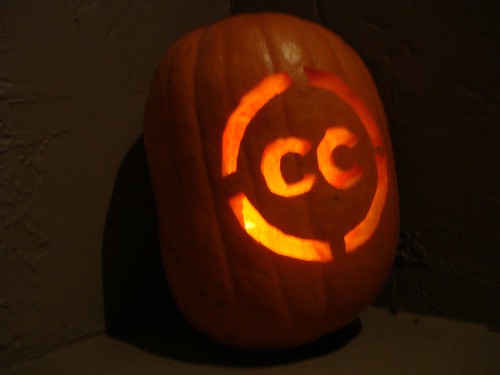
Naturally, the image comes with a Creative Commons licence!


Naturally, the image comes with a Creative Commons licence!
From The Register…
Charles Simonyi, 58, is set to become the 450th person in space, and the fifth amateur cosmonaut to fly to the International Space Station (ISS). He also claims to be the first nerd heading for orbit.
He is slated to take off on 9 March, 2007, provided he completes his training and passes all the medical tests.
Simonyi told the BBC that he had three goals: “One of them is to advance civilian spaceflight, the second to assist space station research, and the third to involve kids in space sciences,” he said.
He says he plans to learn Russian as part of his preparation, and will also bone up on the workings of the rocket that will take him to the space station.
“Learning about the systems is part of my engineering curiosity and makes the whole experience so much more interesting when I understand exactly what is going on and, for example, why the flight is safe,” he explained.
After the eight minute journey to orbit, on board a Russian Soyuz rocket launched from the Baikonaur cosmodrome in Kazakhstan, the software engineer will spend two days travelling to the ISS. He’ll spend eight days on board before returning to Earth.
As with other high profile space tourists, Simonyi has organised his trip through Space Adventures. The ticket to the ISS is thought to cost between $20m and $25m.
One of Simonyi’s more inspired endowments was the money he gave Oxford to establish a Professorship of the Public Understanding of Science — currently occupied by Richard Dawkins.

I’ve had some interesting conversations recently with friends and colleagues about handwriting. I’m perpetually annoyed and puzzled by my own. Some days it seems legible and orderly, but usually I find it intensely irritating. And I wonder why it varies so much from day to day. Is it to do with mood, or hassle or tiredness? Or something else? In many cases (e.g. the pages of my notebook shown in the photograph) my scribbling seems — to me — to be illegible and hopelessly untidy. Other people’s handwriting, in contrast, always seems to me to be orderly and consistent — even when it’s illegible. But then I discover — from talking to them — that they think my handwriting is neat, orderly, legible and consistent, which it manifestly is not! So is it the case that other people’s handwriting always seems better than one’s own?
Another interesting observation. I spend a lot of my working day with techies. Yet — with only two exceptions — they all carry and use paper notebooks. (The two exceptions carry and make notes on tablet PCs.) It’s clear that the paper notebook has a lot of life left in it yet.
And while I’m on the subject, I’ve been to the terrific exhibition of David Hockney’s portraits at the National Portrait Gallery. The pictures are wonderful, but in a way the most fascinating exhibit is the glass case containing three of his notebooks. I was reminded of the story (no doubt apochryphal) about Picasso instructing a builder on changes he wanted to make to one of his studios. As he talked, he made some sketches of what he had in mind. Then he handed them to the builder and said “How much will this cost?” “Nothing”, replied the builder. “Just sign it”.
I followed a link from Jeff Jarvis’s Blog to Armando Ianucci’s Tate Britain lecture, and was very glad I did. He was talking about why British comedy now has so much political content. One passage stopped me in my tracks:
Comedy is so prevalent now, it’s cool by association. So politicians speak and act according to the rhythms of comedy. Labour trying to portray Cameron as a chameleon – it’s an attempted sketch.
This has come about for three reasons: politicians have stopped speaking to us properly, the media has stopped examining their actions in anything like a forensic way, and broadcast culture has become so watered down, so scared of fact, that people are less inclined to turn to anything other than entertainment for information.
Broadcast journalism today promotes itself not so much on what it talks about but on the method it uses: “Broadcasting 24 hours a day, correspondents in over 50 capital cities, giving you all the headlines every 15 minutes, up to six generations of journalists gathered in one newsroom, making you feel all the news you want to feel, even on Christmas Day.” Hi-tech software and speedy transmission makes everything instant news, but we lose sight of the skilled individuals who can process this random unstoppable flow of information and somehow construct a meaningful examination of it. We need narrative.
I found myself hungry for narrative in the build-up to the war in Iraq. Here, surely, were facts – or, indeed, a glaring absence of facts – that required piecing together. Here, surely, it was clear that political debate was operating on a curiously surreal level. We were being asked to attack a country on the basis that the weapons we knew (but couldn’t prove) it had would definitely be used against us, especially if we attacked it. This Alice Through the Looking Glass logic has continued after the invasion. Now, it seems, it was necessary to have invaded Iraq to rid the world of the terrorist cells who have flooded into the country since it was invaded. The terrorist attacks in London and mainland Europe since are, officially, unconnected with the invasion of a country that was invaded because it had links with terrorist attacks in mainland Europe.
My favourite quotation from the eminently quotable George Bush is a remark he made last year about the constant attacks on US troops in Iraq: “The insurgents are being defeated; that’s why they’re continuing to fight.” It’s a stunning reversal of all logic. Measuring success in terms of how far you are from success. An even stranger utterance came from Tony Blair at Labour’s 2004 Conference when he defended his actions by saying: “Judgments aren’t the same as facts. Instinct is not science. I only know what I believe.
“I only know what I believe.” I find that one of the most chilling statements uttered by a seemingly rational politician. Apart from the fact that it overturns about 16 centuries of western philosophy and questions the entire principle of scientific inquiry, it’s also, surely, how the Taliban get through their day…
Afterwards… I found it hard to believe that Blair had said that, so I checked with the text. He did say it.
I’m also reminded of the “balance as bias” phenomenon which came up in a something I posted in 2003 about Paul Krugman’s Harvard lecture.
From Greg Verdino’s Blog.
Today, I am off to Nielsen BuzzMetrics’ clients-only CGM Summit 2006. The agenda is cram packed with sessions covering all aspects of Consumer Generated Media (CGM) including an overview of where we are today, why people do this stuff, where CGM is going in the future, and how exactly marketers can leverage and measure this powerful channel. Ironically, the confirmation email I received for the event includes this warning:
“Off The Record: the CGM Summit is off the record, so please no blogging, reporting, recording or broadcasting.”
Hmmm… So how can you host an event about consumer generated media and not let your consumers, um, generate media?
Amnesty is campaigning to support bloggers who are being censored or imprisoned for their views. There’s an online petition here.
In his column this morning, my colleague Peter Preston mentions ACAP — the initiative launched by the World Association of Newspapers to control access to newspaper sites by search engines. Here’s a useful summary of the proposal:
The World Association of Newspapers, European Publishers Council (EPC), International Publishers Association and European Newspaper Publishers’ Association will pilot an Automated Content Access Protocol (ACAP) beginning 6 October at the Frankfurt Book Fair, said Kaye, who is advising on the project.
ACAP will allow content providers to systematically grant permissions information relating to access and use of content in a form that can be read by ‘crawlers’ so search engine operators and any other users can automatically comply with applicable licenses or policies, the EPC said. There are already existing protocols to help website owners tell search engine ‘spiders’ which areas of a site can be indexed. ACAP will not replace them, but will try to overcome problems such as the simplistic nature of the permissions they control, basically, ‘yes, please spider this page’ or ‘no, please do not spider this page.’
During the 12-month pilot, publishers will develop terms and conditions for the search engines to whom they have given the authority to automatically search and index their works. If successful, the standard will allow all publishers to take a tailored approach to search engines, ultimately enriching users’ experiences, the EPC said. While the project will focus first on the needs of print publishers, it will be usable for every type of online content, including video and audio.
To an Orwellian analyst of language, the interesting phrase is “enriching users’ experiences”. What form will this “enrichment” take? Why, this:
ACAP is supposed to tell a search engine something like this: ALLOW, but only for two weeks, then delete from cache and redirect to payment gateway instead.
I can see why newspapers would want to do this, but the only “enrichment” that would follow from it is theirs.
More seriously: do newspapers really think this is going to help them in the long run? In a way, we’ve been here before — with those arguments years ago about ‘deep linking’. I seem to remember that the New York Times got it and negotiated a deal with Dave Winer which gave blogs access to deep-linked pages while diverting ‘ordinary’ visitors to the paywall gateway. In a networked world, the only way you’re going to have any influence (or be read) is to have properly-linkable content. End of story. And if that doesn’t fit with your existing business model, then maybe you need a new one.
This morning’s Observer column…
I wonder if anyone in the Microsoft empire has ever read George Orwell’s essay on ‘Politics and the English Language’, that admirable meditation on the ways in which language can be used to obscure inconvenient truths. Consider his observation that ‘modern writing at its worst does not consist in picking out words for the sake of their meaning and inventing images in order to make the meaning clearer. It consists of gumming together long strips of words which have already been set in order by someone else, and making the results presentable by sheer humbug.’
The Microsoft humbug division has been working overtime in recent years. Example: Windows ‘Plays for Sure’ – a standard which, according to the company, ‘makes it easy to find digital media stores and devices that work together’. In fact, it’s just a euphemism for the particular digital rights management (DRM) system they’re using with Windows Media, and is essentially Microsoft’s attempt to counter the dominance of Apple’s iTunes Music Store (which in turn employs its own distinctive ‘plays for sure – but only on iPods’ DRM system). It would perhaps be more accurate to say that Microsoft ‘Plays for Sure’ really means ‘plays on Windows-based platforms’, but that would involve telling the truth…

One of my favourite places to eat in London is the brasserie in the Groucho Club. You can guess where the name came from. If not, try here. I’ve been a member since 1989. Among its attractions is pervasive Wi-Fi, so I find it a great place to work when in London.
Interesting comment by ex-Oracle insider, Dave Dargo, on Larry Ellison’s bluster about stealing Red hat’s business. Excerpt:
But what about the other part of [Ellison’s] quote, that [Oracle’s] support has to be better. There’s a survey from CIOInsight that shows Red Hat is the number one vendor for value as rated by CIO’s in 2004 and 2005. Where does Oracle fit on that chart? Glad you asked, they ranked 39 out of 41.
The other thing I’m most curious about is the concept of Oracle’s Unbreakable Linux Network (ULN). The claim is that it takes less than a minute to switch from Red Hat’s Network (RHN) to ULN. It’s going to take more than a minute, and a fair amount of cost, to get through the legal agreements and process of switching over. But even with that aside, I’m mostly curious as to why Oracle’s first real support network is for someone else’s product. Where’s the Oracle Database Network and Applications Network and PeopleSoft Network and Siebel Network? Where are the support infrastructure networks for Oracle’s own products to automatically distribute fixes, patches and alerts? It’s amazing that they can provide all that for a mere $399 for a competitor’s products, but not for their own $200,000 product…